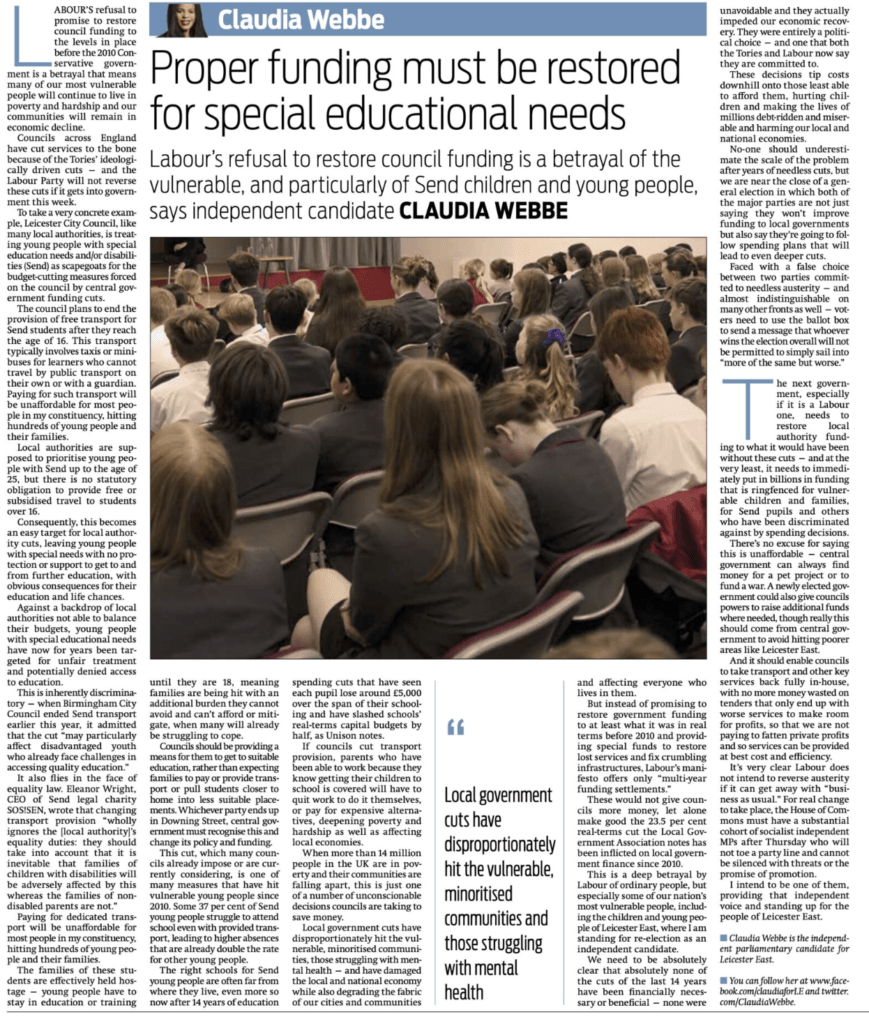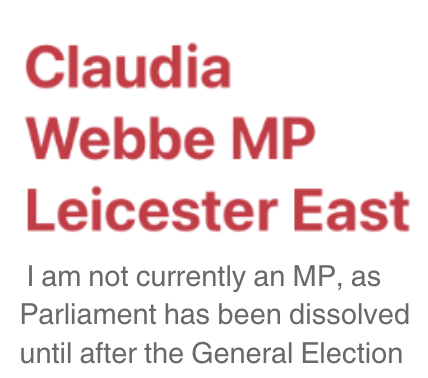
Proper funding must be restored for special educational needs
By Claudia Webbe MP
Labour’s refusal to restore council funding is a betrayal of the vulnerable, and particularly of Send children and young people, says independent candidate CLAUDIA WEBBE
LABOUR’S refusal to promise to restore council funding to the levels in place before the 2010 Conservative government is a betrayal that means many of our most vulnerable people will continue to live in poverty and hardship and our communities will remain in economic decline.
Councils across England have cut services to the bone because of the Tories’ ideologically driven cuts — and the Labour Party will not reverse these cuts if it gets into government this week.
To take a very concrete example, Leicester City Council, like many local authorities, is treating young people with special education needs and/or disabilities (Send) as scapegoats for the budget-cutting measures forced on the council by central government funding cuts.
The council plans to end the provision of free transport for Send students after they reach the age of 16. This transport typically involves taxis or minibuses for learners who cannot travel by public transport on their own or with a guardian. Paying for such transport will be unaffordable for most people in my constituency, hitting hundreds of young people and their families.
Local authorities are supposed to prioritise young people with Send up to the age of 25, but there is no statutory obligation to provide free or subsidised travel to students over 16.
Consequently, this becomes an easy target for local authority cuts, leaving young people with special needs with no protection or support to get to and from further education, with obvious consequences for their education and life chances.
Against a backdrop of local authorities not able to balance their budgets, young people with special educational needs have now for years been targeted for unfair treatment and potentially denied access to education.
This is inherently discriminatory — when Birmingham City Council ended Send transport earlier this year, it admitted that the cut “may particularly affect disadvantaged youth who already face challenges in accessing quality education.”
It also flies in the face of equality law. Eleanor Wright, CEO of Send legal charity SOS!SEN, wrote that changing transport provision “wholly ignores the [local authority]’s equality duties: they should take into account that it is inevitable that families of children with disabilities will be adversely affected by this whereas the families of non-disabled parents are not.”
Paying for dedicated transport will be unaffordable for most people in my constituency, hitting hundreds of young people and their families.
The families of these students are effectively held hostage — young people have to stay in education or training until they are 18, meaning families are being hit with an additional burden they cannot avoid and can’t afford or mitigate, when many will already be struggling to cope.
Councils should be providing a means for them to get to suitable education, rather than expecting families to pay or provide transport or pull students closer to home into less suitable placements. Whichever party ends up in Downing Street, central government must recognise this and change its policy and funding.
This cut, which many councils already impose or are currently considering, is one of many measures that have hit vulnerable young people since 2010. Some 37 per cent of Send young people struggle to attend school even with provided transport, leading to higher absences that are already double the rate for other young people.
The right schools for Send young people are often far from where they live, even more so now after 14 years of education spending cuts that have seen each pupil lose around £5,000 over the span of their schooling and have slashed schools’ real-terms capital budgets by half, as Unison notes.
If councils cut transport provision, parents who have been able to work because they know getting their children to school is covered will have to quit work to do it themselves, or pay for expensive alternatives, deepening poverty and hardship as well as affecting local economies.
When more than 14 million people in the UK are in poverty and their communities are falling apart, this is just one of a number of unconscionable decisions councils are taking to save money.
Local government cuts have disproportionately hit the vulnerable, minoritised communities, those struggling with mental health — and have damaged the local and national economy while also degrading the fabric of our cities and communities and affecting everyone who lives in them.
But instead of promising to restore government funding to at least what it was in real terms before 2010 and providing special funds to restore lost services and fix crumbling infrastructures, Labour’s manifesto offers only “multi-year funding settlements.”
These would not give councils more money, let alone make good the 23.5 per cent real-terms cut the Local Government Association notes has been inflicted on local government finance since 2010.
This is a deep betrayal by Labour of ordinary people, but especially some of our nation’s most vulnerable people, including the children and young people of Leicester East, where I am standing for re-election as an independent candidate.
We need to be absolutely clear that absolutely none of the cuts of the last 14 years have been financially necessary or beneficial — none were unavoidable and they actually impeded our economic recovery. They were entirely a political choice — and one that both the Tories and Labour now say they are committed to.
These decisions tip costs downhill onto those least able to afford them, hurting children and making the lives of millions debt-ridden and miserable and harming our local and national economies.
No-one should underestimate the scale of the problem after years of needless cuts, but we are near the close of a general election in which both of the major parties are not just saying they won’t improve funding to local governments but also say they’re going to follow spending plans that will lead to even deeper cuts.
Faced with a false choice between two parties committed to needless austerity — and almost indistinguishable on many other fronts as well — voters need to use the ballot box to send a message that whoever wins the election overall will not be permitted to simply sail into “more of the same but worse.”
The next government, especially if it is a Labour one, needs to restore local authority funding to what it would have been without these cuts — and at the very least, it needs to immediately put in billions in funding that is ringfenced for vulnerable children and families, for Send pupils and others who have been discriminated against by spending decisions.
There’s no excuse for saying this is unaffordable — central government can always find money for a pet project or to fund a war. A newly elected government could also give councils powers to raise additional funds where needed, though really this should come from central government to avoid hitting poorer areas like Leicester East.
And it should enable councils to take transport and other key services back fully in-house, with no more money wasted on tenders that only end up with worse services to make room for profits, so that we are not paying to fatten private profits and so services can be provided at best cost and efficiency.
It’s very clear Labour does not intend to reverse austerity if it can get away with “business as usual.” For real change to take place, the House of Commons must have a substantial cohort of socialist independent MPs after Thursday who will not toe a party line and cannot be silenced with threats or the promise of promotion.
I intend to be one of them, providing that independent voice and standing up for the people of Leicester East.
Claudia Webbe is the independent parliamentary candidate for Leicester East.
You can follow her at www.facebook.com/claudiaforLE and twitter.com/ClaudiaWebbe


